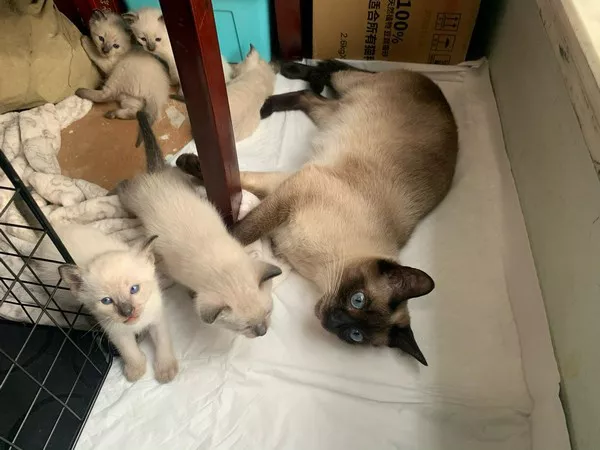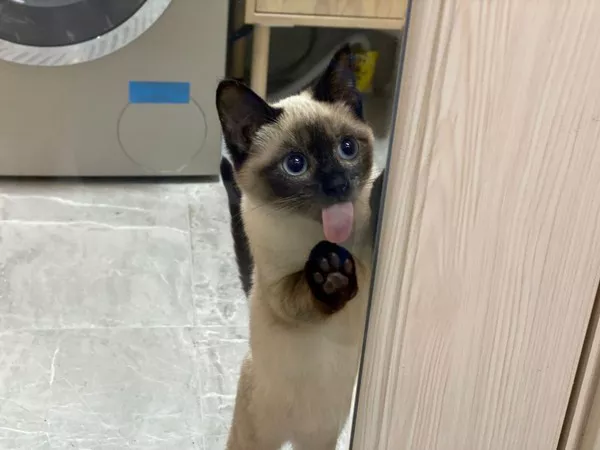As beloved companions, Siamese cats hold a special place in the hearts of many cat lovers. Renowned for their striking appearance, vocal nature, and affectionate demeanor, Siamese cats make delightful additions to any household. However, despite their endearing qualities, some Siamese cat owners may find themselves grappling with a concerning issue: excessive vomiting. In this article, we delve into the potential reasons behind why Siamese cats may vomit frequently, exploring various factors that could contribute to this common and distressing problem.
Understanding the Normalcy of Vomiting in Cats
Before delving into the specific reasons behind excessive vomiting in Siamese cats, it’s essential to establish a basic understanding of vomiting in felines. Vomiting is a natural physiological response that serves as a mechanism for expelling foreign objects, toxins, or irritants from the stomach. While occasional vomiting is considered normal in cats and may be prompted by factors such as hairballs, overeating, or dietary indiscretion, frequent or persistent vomiting warrants closer attention and investigation.
Genetic Predispositions: Unraveling the Role of Breed-Specific Traits
One potential factor contributing to excessive vomiting in Siamese cats is their breed-specific genetic predispositions. While Siamese cats are generally healthy and robust, they may be more prone to certain health conditions or sensitivities that could manifest as gastrointestinal issues. For example, Siamese cats may have a higher incidence of inflammatory bowel disease (IBD), a chronic condition characterized by inflammation of the gastrointestinal tract, which can lead to symptoms such as vomiting, diarrhea, and weight loss.
Dietary Sensitivities: Navigating the Complexities of Feline Nutrition
Another common culprit behind excessive vomiting in Siamese cats is dietary sensitivities or allergies. Cats, like humans, can develop sensitivities to certain ingredients in their food, such as proteins, grains, or additives. Siamese cats may be particularly susceptible to dietary sensitivities due to their genetic makeup or predisposition to certain health conditions. In some cases, commercial cat foods containing artificial colors, flavors, or preservatives may trigger adverse reactions in sensitive individuals, leading to gastrointestinal upset and vomiting.
Hairballs: Managing the Challenge of Feline Grooming Habits
One of the most frequent causes of vomiting in cats, including Siamese cats, is the formation of hairballs. Siamese cats are known for their short, fine coats, which may shed more frequently than those of other breeds. As a result, Siamese cats may inadvertently ingest loose hair while grooming themselves, leading to the accumulation of hairballs in the stomach. While occasional vomiting to expel hairballs is considered normal, excessive vomiting or the presence of other symptoms may indicate an underlying issue that requires attention.
Stress and Anxiety: Recognizing the Impact of Environmental Factors
Stress and anxiety can have a significant impact on a cat’s overall health and well-being, potentially manifesting as gastrointestinal disturbances such as vomiting. Siamese cats, known for their social nature and strong bonds with their owners, may be particularly sensitive to changes in their environment or routine. Factors such as moving to a new home, the introduction of a new pet or family member, or changes in household dynamics can trigger stress-related vomiting in Siamese cats. Providing a stable and nurturing environment, as well as opportunities for mental stimulation and enrichment, can help alleviate stress and reduce the frequency of vomiting episodes.
Medical Conditions: Considering Underlying Health Issues
In some cases, excessive vomiting in Siamese cats may be indicative of underlying medical conditions that require veterinary attention. Gastrointestinal disorders such as gastroenteritis, pancreatitis, or gastric ulcers can cause chronic vomiting and may require diagnostic testing and treatment. Additionally, systemic diseases such as kidney disease, hyperthyroidism, or diabetes mellitus can manifest with gastrointestinal symptoms, including vomiting. It is essential for Siamese cat owners to monitor their pets closely for any changes in behavior or appetite and to consult with a veterinarian if vomiting persists or is accompanied by other concerning symptoms.
Toxic Exposures: Protecting Siamese Cats from Harmful Substances
Exposure to toxic substances or ingesting foreign objects can pose serious health risks to Siamese cats and may result in vomiting as a protective mechanism. Common household hazards such as plants, chemicals, medications, and certain human foods can be toxic to cats if ingested. Siamese cats, known for their curious nature and tendency to explore their surroundings, may inadvertently come into contact with harmful substances. It is crucial for cat owners to be vigilant in identifying and removing potential hazards from their homes and to seek immediate veterinary care if their Siamese cat shows signs of poisoning or illness.
Age-Related Changes: Addressing the Needs of Senior Siamese Cats
As Siamese cats age, they may become more susceptible to certain health issues that can contribute to vomiting. Senior cats may experience age-related changes in organ function, dental health, or mobility, which can impact their overall well-being. Conditions such as chronic kidney disease, dental disease, or arthritis may lead to gastrointestinal symptoms, including vomiting. Siamese cat owners should be proactive in addressing the unique needs of their senior pets, including regular veterinary check-ups, age-appropriate nutrition, and modifications to their environment to accommodate age-related changes.
Environmental Toxins: The Impact of Indoor and Outdoor Factors
Environmental toxins, both indoors and outdoors, can pose a significant threat to the health and well-being of Siamese cats and may contribute to vomiting. Indoor pollutants such as cigarette smoke, household cleaners, or air fresheners can irritate a cat’s respiratory system and gastrointestinal tract, leading to vomiting. Outdoor hazards such as pesticides, fertilizers, or toxic plants can also pose risks to cats if ingested. Siamese cat owners should take precautions to minimize their pets’ exposure to environmental toxins and ensure that their indoor and outdoor environments are safe and toxin-free.
Conclusion: Navigating the Complexities of Vomiting in Siamese Cats
In conclusion, excessive vomiting in Siamese cats can be a distressing issue for both pets and their owners. While occasional vomiting may be normal in cats, frequent or persistent vomiting warrants closer attention and investigation to identify and address any underlying causes. Factors such as genetic predispositions, dietary sensitivities, hairballs, stress, medical conditions, toxic exposures, age-related changes, and environmental toxins can all contribute to vomiting in Siamese cats. By working closely with a veterinarian to evaluate their cat’s health and address any underlying issues, Siamese cat owners can help their beloved pets live happy, healthy, and vomit-free lives.


























